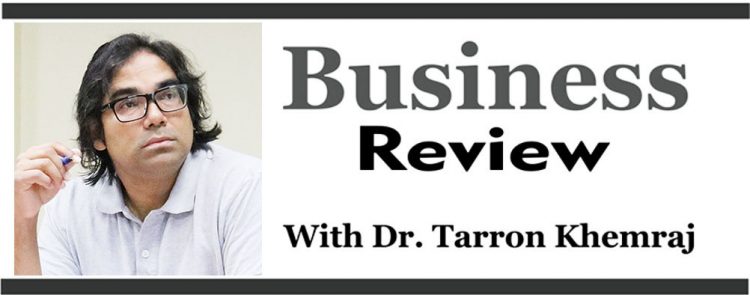 The previous column discussed several important international functions the dollar performs. The dollar serves as an international store of value enabling countries that earn foreign exchange to save in an easily convertible currency. It serves as a medium of exchange allowing payments beyond the American border. It also serves as a unit of account permitting businesses to express prices in a unified medium. I did not mention this final function: the dollar is used for settling a large percentage of international debt. Developing countries are acutely aware of the latter function since they have to repay their foreign debt in dollars.
The previous column discussed several important international functions the dollar performs. The dollar serves as an international store of value enabling countries that earn foreign exchange to save in an easily convertible currency. It serves as a medium of exchange allowing payments beyond the American border. It also serves as a unit of account permitting businesses to express prices in a unified medium. I did not mention this final function: the dollar is used for settling a large percentage of international debt. Developing countries are acutely aware of the latter function since they have to repay their foreign debt in dollars.
The international role of the dollar is quite unique from a historical standpoint, given that we are living under an international monetary system in which currencies are not tied to gold or any other precious metal. This system is informally known as the international fiat system, which has to be distinguished from the era of Bimetallism, the classical Gold Standard and Bretton Woods. Under Bimetallism and the Gold Standard, the international system had an element of self-adjustment, meaning a deficit country experienced a loss of gold and silver causing it to raise the interest rate and contract internal demand.
The demand contraction in the deficit country also restricts spending on the exports of the surplus country. Moreover, the higher gold and silver inflows tended to increase inflation in the surplus nation, causing a short-term decrease in competitiveness. These factors caused the international system to adjust in order to correct imbalances.
No such self-adjustment is evident in the global fiat system under which the American dollar plays several key roles discussed in the previous column. Even the fiat British pound did not assume such a prominent role since it had to be redeemed, at some point, into gold and silver. Even at its peak, economic historians have noted that the pound sterling was never the most desirable invoice currency.
In the contemporary fiat system, the United States has assumed the largest deficit-nation role. By running trade and current account deficits, the US opens up its market for surplus nations, namely China, South Korea, Japan, Singapore and others. In North America, the US runs trade deficits against Canada and Mexico, forming the most important market for its two neighbours. Surplus countries accumulate dollar assets and the US a corresponding liability. These dollar assets are often expressed as central banks’ international reserves or in a few cases saved in sovereign wealth funds.
Various opinions have been expressed about the above persistent imbalance, most notably by Robert Triffin, after whom the Triffin paradox (or dilemma) was named. Triffin’s paradox holds that should the US stop running trade and current account deficits, the surplus countries will lose an important savings instrument.
No one knows how long the above imbalance can continue. In any case, change will not occur dramatically but gradually over a long period of time. Some have argued that the change is already occurring as more trades are settled in the Chinese yuan and the euro presents a credible alternative. Indeed, China has increased the use of the yuan for its own cross-border payments. Recent research notes that China is now able to settle 47% of payments vis-à-vis the world in its own currency. However, the use of the yuan by other countries for non-China trades is still limited. Argentina and Brazil have signaled that they will be willing to settle some of their payments with China in the yuan, while the Indian media went hysterical recently when it was leaked that Indian oil refiners might settle some of their liabilities with Russia using the yuan. Russia urgently needs the yuan in order to settle some of its liabilities with China. Yuan’s internationalization will be restrained not only by the US and other Western allies, but also India as long as its border controversy with China festers.
The reason, however, why the yuan will not challenge the dollar’s role as dominant reserve, invoice and vehicle currency is more fundamental. China’s economic system is still very much dependent on being export-led with a focus on achieving trade and current account surpluses year after year.
China will have to be willing to assume deficits that supply the rest of the world with its own sovereign assets – something the US legal system, as well as its respect for private property rights, wide-ranging and deep money and capital markets, and somewhat better than quasi-democracy make seamless.
For starters, China will have to boost private consumption as a percentage of GDP that currently stands at around 55% compared with the 81% for the US.
China will have to allow low-income and relatively advanced emerging economies to export a lot more of their goods and services to its large market up to the point where it runs deficits relative to underdeveloped regions. It will have to become the world’s consumer market as the US has done for decades.
Instead, some of the savings that China earns from persistent surpluses have been redeployed by its government to the developing world for building much-needed infrastructure work.
This approach is still very different than the role America plays in opening its giant market to exports from others.
When the US runs a deficit, the rest of the world (namely the surplus countries) accumulate sovereign assets against which they earn interest over time. When China redirects some of its vast savings to developing countries, it is providing a liability or a debt which has to be repaid with interest. A debt versus an equity model of internationalization is the primary reason why the yuan will have an upper limit in the world economy, I believe.
The euro, the currency of the countries of the European Monetary Union (EMU), also faces a constraint that Neo-Chartalists and an unorthodox economist, Charles Goodhart, have outlined for a little over three decades.
The argument goes as follows: the euro was motivated by a theory that assumed money came about because of the problems of barter. Neo-Chartalists, on the other hand, argue that money emerged because the emperor (or empress) or the state declares it to be money for the purpose of paying taxes by the subjects or citizens. Individuals later observe the convenience of the sovereign money for settling payments and private debts.
The implication of the Neo-Chartalist theory is a central bank without a unified fiscal policy will complicate debt management, a situation that became evident during the European debt crisis.
The idea is also relevant to the internationalization of the euro. With a unified fiscal mechanism (taxation and spending), EMU countries will be able to issue unified sovereign bonds and treasuries, instead of the debt offered by different nations in the EMU. The pool of European sovereign securities is limited by the incoherence and localization of fiscal policies.
However, unification of taxes, spending, debt and introducing a revenue sharing system will require deeper political union, likely approaching federalism. This is very difficult to achieve in these times of the rise of ethno-nationalism and lessons from Britain’s exit from the European Union (not to be confused with the EMU). Back in 2014, I wrote a few columns under Development Watch on “Caribbean convergence” making a similar argument relative to Caribbean integration using a Neo-Chartalist framework.
In closing, the greatest threat to the dollar is not external, but internal as the American “democratic” system elects folks who believe there are no consequences for defaulting – as a matter of choice! – on the national debt. It should be noted that the US is nowhere near a default and a large fraction of the debt is actually owned by the federal government or agencies backed by the government, as well as the Federal Reserve.
The total debt as at first quarter of 2023 is US$31.5 trillion; if we subtract the amount held by the government, its agencies and Federal Reserve the outstanding debt is US$19.6 trillion or 74% of GDP at the end of the first quarter of 2023.
The “democratic” system also elects Ivy League sophisticates who seem to believe that overusing sanctions – reversing the right to private property – will not elicit a strategic reaction from other countries, as we learn in elementary game theory.
Comments: [email protected]







